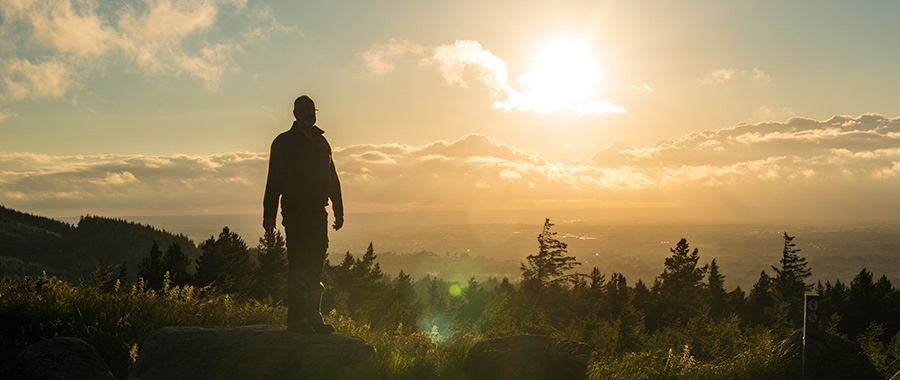The views expressed in our content reflect individual perspectives and do not represent the authoritative views of the Baha'i Faith.
As Freud stated, we humans are “pleasure seeking, pain avoiding” creatures.
Interestingly, we put pain behind us for the most part, except when it demands our immediate attention. When we are in pain, like a bad toothache, or suffering in bed with a virus, or whatever ailment, problem, difficulty or roadblock that presents itself, we focus only on that moment. In that moment it’s hard to think of something worse—and often, the imagination makes it seem far worse than it usually is.
Likewise, when the pain is over and we are back to our old selves, the memory of pain and discomfort fades from our consciousness, probably compartmentalized and put away, as we don’t want to remember or dwell on past pain for long. Perhaps this human ability to forget the intensity of pain contributes to the willingness of mothers to have more than one child.
It is a wonderful ability we humans have to be able to do that, or we would be walking basket cases most of the time, forever whining and complaining to all who listen. For we all seek sympathy, or at least empathy when we suffer—it’s only natural. So if we naturally seek pleasure and avoid pain, the question becomes “What pleasure truly lasts?”
Baha’u’llah wrote about achieving that true bliss and contentment in his book The Seven Valleys, and described “divine contentment” this way
In this Valley he feeleth the winds of divine contentment blowing from the plane of the spirit. He burneth away the veils of want, and with inward and outward eye, perceiveth within and without all things the day of: “God will compensate each one out of His abundance.” From sorrow he turneth to bliss, from anguish to joy. His grief and mourning yield to delight and rapture.
Although to outward view, the wayfarers in this Valley may dwell upon the dust, yet inwardly they are throned in the heights of mystic meaning; they eat of the endless bounties of inner significances, and drink of the delicate wines of the spirit. – Baha’u’llah, The Seven Valleys, p. 29.
Neuroscientists have noted that we remember joys and pleasant experiences much more readily than pain. We can turn our endorphins on just by thinking or imagining happy thoughts, generating a positive, happy response in our brains, our bodies, and our spirits. We go out of our way to capture happy, pleasing moments on our cellphones or cameras, and seldom take pictures of ourselves in bed with a cold, or of someone suffering in a hospital bed. My wife and I have taken hundreds of pictures of our children, and only one shows my son sitting up in his sickbed, covered by red chicken pox marks with a look of distress plastering his face and demeanor.
We all survived that disease, and our son and my wife and I put those negative experiences behind us. If it weren’t for that photo I would hardly remember how miserable he felt, and we for him.
Thankfully the days free of pain, for most of us, outnumber the days of pain and discomfort. Naturally we always find it easy to remember a granddaughter’s birthday party, or receiving praise or an award, or being in good financial condition. Remember, those endorphins fly when we remember positive events and feelings, making them even more memorable.
In every case of pain, whether trying to battle a bad case of sciatica running down your right leg, or chicken pox or any other serious disease, if we stop for a moment, we can think of someone experiencing worse pain.
The thing about pain, even the fear of being in pain, or of dying for that matter, is that our imaginations run wild, and we conjure up pure horror stories that scare and worry us to death. When, if we’re honest, usually the experience, or a beneficial outcome after proper treatment, has made the actual pain much less. Real pain comes from the fear of greater pain, or the pain never stopping.
Of course, no one likes pain, nor should they. But it is only through pain and suffering that we develop our inner characters and inner strengths, even our physical strengths. Remember the old saying, “No pain, no gain?” Even the death of a loved one and the grief we feel—overwhelming, sad, and heartbreaking—must give way to forgetfulness, peace, and acceptance.
Briefly, pain is transitory and we tend to forget it as soon as we can. Therefore, the “good old days” always seem much better then they actually were. Our negative memories fade away, and the positive ones remain, giving the past a rosy glow that it doesn’t really deserve.
I don’t miss the days when cars were unsafe without seatbelts, or there were no lights for pedestrian crossings, or drugs could be sold in front of a school when they are totally interdicted now, with punishments doubled. I don’t miss the days when I always wore slacks instead of comfortable jeans, or wearing a beard was unacceptable, or when cars and trucks and factories spewed smoke without controls and safeguards.
I rather like the 21st century, thank you, and this year in particular. I’m older, wiser, comfortable with some resources, almost own my home, have grown kids doing well, and more. Thirty years ago those were our pipe dreams. We worked hard to get where we are, and we can easily say today, “No thank you. We don’t want to go backwards to the good old days, which were nowhere near as good as today.”
My son Jesse published a book called The Secret Peace: Positive Trends in the World, in 2010, outlining the amazing advances humanity has made in the last century. We’ve made incredible advances in medicine, science and technology; in decreasing crime and violence (wars); in feeding the hungry and providing for the poor; and in improved women’s health and education and more. The good old days were plain rotten in comparison.
But despite all the advances, we are still seeking bliss. True bliss is not all material; only partially so. True and lasting bliss is spiritual. Those “delicate wines of the spirit” are the love of God and His precepts. True bliss and happiness can be found when we submit our will to the Will of the Almighty’s, where all pain and suffering is just a stepping stone to joy.
















Comments
Sign in or create an account
Continue with Googleor